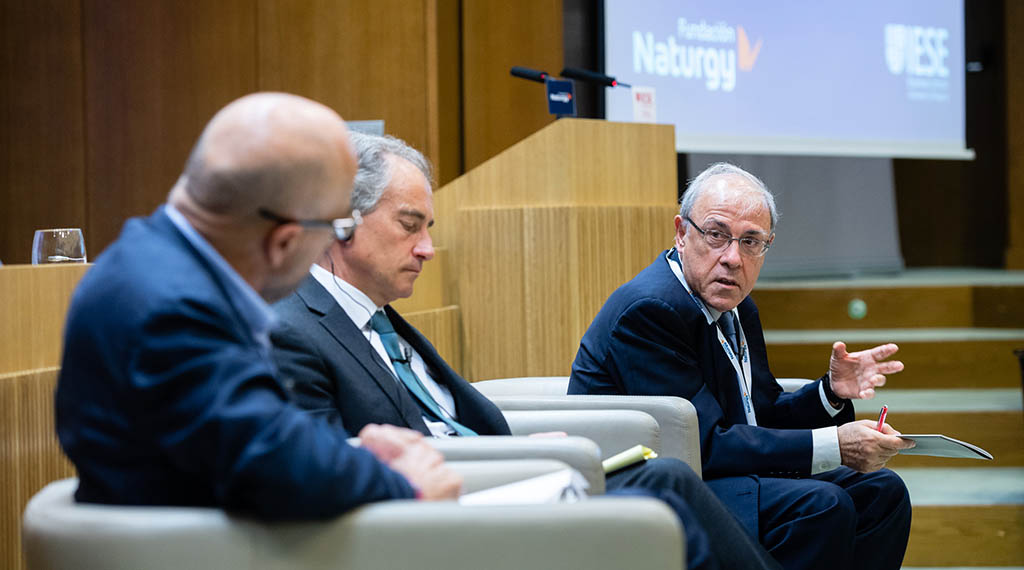Stories
Will EU reach deep decarbonization goals?
Energy Prospectives seminar maps out course for cutting emissions in Europe
Ignacio Pérez Arriaga, Christopher Jones and professor Javier Díaz-Giménez discuss what the EU must do to reduce emissions.
Photo: Javier Arias
June 27, 2019

The European Union is facing a challenge with few historic precedents: full decarbonization of its economy by 2050. To get there, all member states will have to step up efforts to cut emissions, and even then it’s not clear that global emissions will be significantly lower.
“Europe is small, especially in terms of the impact of its emissions policies,” Ignacio Pérez Arriaga, BP Chair of Sustainable Development at the Universidad Pontificia de Comillas, said during the second Energy Prospectives seminar, organized by IESE and the Fundación Naturgy.
“At the end of the day, it only accounts for 10% of world CO2 emissions and couldn’t, even with the most drastic and successful measures, beat climate change if the U.S., China and the emerging economies do not make similar efforts. Thus, its persuasive powers will be even more decisive than its sacrifices.”
The seminar also featured Christopher Jones, a strong proponent from the European Commission of the 20/20/20 agenda for emissions reductions and current senior advisor for Baker McKenzie in Brussels, and professor Javier Díaz-Giménez.
The experts agreed that the EU’s emissions objectives are daunting and, at the same time, unavoidable. The EU must lead by example, open the way and engage with future generations by leaving them a cleaner and more stable planet. However, it will not achieve this if it does not bear these three keys in mind:
1. Stable (and demanding) policies. “Energy policy has to be a state policy, without sudden shifts,” Pérez Arriaga said. He said governments must introduce incentives to reward consumers, investors and energy companies for committing to renewables. They should also set specific goals and measures to reach them, Jones said. “The European Commission should be able to warn and sanction countries that stray from the path,” Jones added.
2. Realistic ambitions. Decarbonization will be neither easy nor universally popular, the experts noted. Jones said many forecasts on emissions reductions are overly optimistic because, among other things, they assign a heroic role to nuclear power. They also exaggerate the effects of efficiencies that are almost impossible to reach without such drastic measures as prohibiting the sale of homes that cannot certify their decarbonization.
“This doesn’t mean that we shouldn’t insist on the fight against climate change, but rather that it will have to be done by taking complex and unpopular decisions that will need to be correctly explained to those affected and sometimes be accompanied by subsidies,” Jones said.
3. Global vision. Jones said decarbonization requires major spending on research into the development of batteries and storage systems, on interconnecting markets and on large infrastructure projects. Furthermore, he added that it is essential to allow markets to play an important role as the drivers of renewable energies. “All the measures taken should take into account the relationship between the costs and benefits, their impact on the competitiveness of companies and the potential creation of employment,” Jones said.


